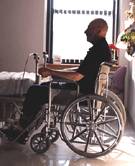- Could Your Grocery Store Meat Be Causing Recurring UTIs?
- Are You Making This Expensive Thermostat Error This Winter?
- Recognizing the Signs of Hypothyroidism
- 10 Strategies to Overcome Insomnia
- Could Artificial Sweeteners Be Aging the Brain Faster?
- Techniques for Soothing Your Nervous System
- Does the Water in Your House Smell Funny? Here’s Why
- Can a Daily Dose of Apple Cider Vinegar Actually Aid Weight Loss?
- 6 Health Beverages That Can Actually Spike Your Blood Sugar
- Treatment Options for Social Anxiety Disorder
Heart Failure Patients Who Struggle With Daily Tasks at Greatest Risk


Heart failure patients who struggle to perform daily tasks are at increased risk for hospitalization and death, a new study shows.
The study included more than 1,100 people with heart failure, average age 75, who were classified as having either minimal, moderate or severe difficulty with activities such as getting dressed, cleaning the house, climbing stairs, taking medications and using the bathroom.
“Difficulty with daily living is easy to assess in a routine doctor’s visit, and can provide important information to help guide conversations about goals of care,” wrote study author Dr. Shannon Dunlay, an advanced heart failure cardiologist at the Mayo Clinic in Rochester, Minn.
“Patients who report difficulties may be candidates for a more thorough assessment and physical therapy evaluation to improve or halt the decline in mobility,” she added. “Our findings support the assessment of mobility as a part of the routine clinical care of patients with heart failure.”
In the study, nearly one-fifth of the heart failure patients were obese and most had other medical conditions such as high blood pressure (87 percent), anemia (57 percent) and diabetes (36 percent).
Almost 60 percent of the patients had difficulty with one or more daily tasks at the start of the study, including 24 percent who had moderate difficulty and nearly 13 percent who had severe difficulty.
Older women, unmarried people and those with obesity, diabetes or anemia had more difficulty with daily activities and mobility. Heart failure patients with dementia had difficulty with twice as many daily tasks as others.
During about three years of follow-up, 910 of the heart patients were hospitalized and 614 died. Heart failure was the most common cause of hospitalization (18 percent), followed by heart rhythm disorders (nearly 5 percent), and pneumonia (4 percent).
Average length of survival was close to six years for those with minimal difficulty with daily activities, three years for those with moderate difficulty, and 1.5 years for those with severe difficulty, according to the study published Feb. 25 in the journal Circulation: Heart Failure.
“We suspect that the difficulty with daily activities that we observed is not entirely attributable to the patients’ heart failure,” Dunlay said in a journal news release.
“Most patients with heart failure are elderly and have many other chronic conditions, and we need to consider providing comprehensive care,” she noted.
More than 5 million Americans have heart failure, the researchers noted.
More information
The U.S. National Heart, Lung, and Blood Institute has more about heart failure.
Source: HealthDay
Copyright © 2026 HealthDay. All rights reserved.










